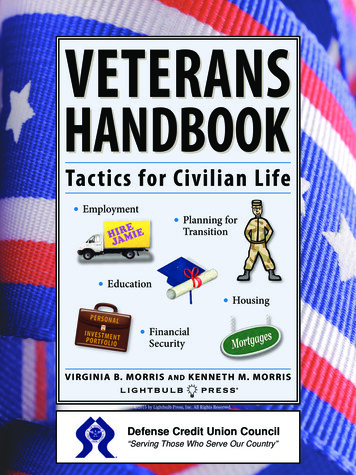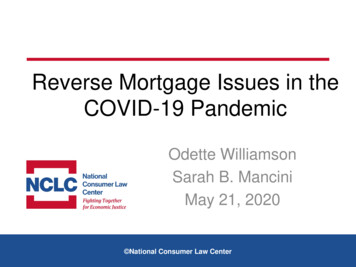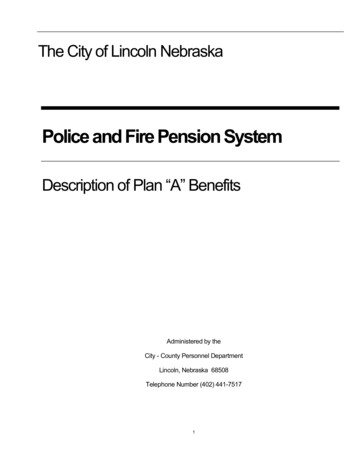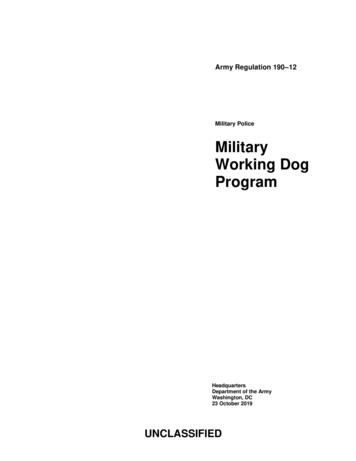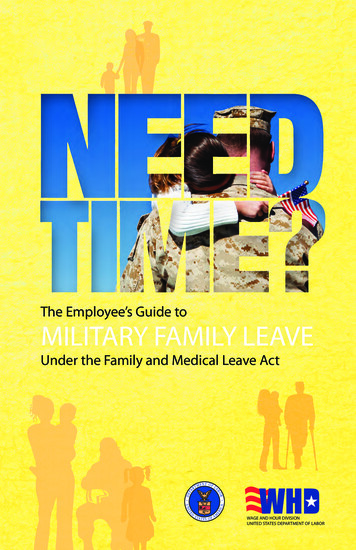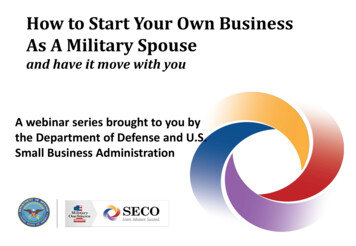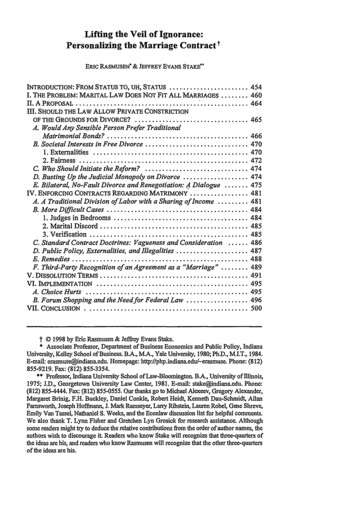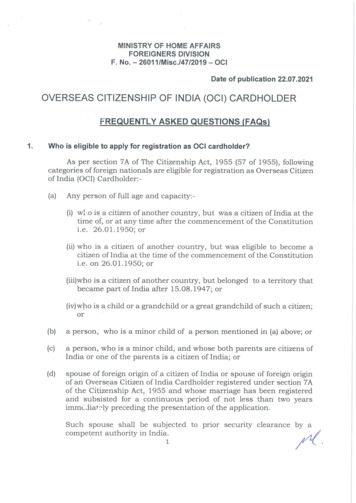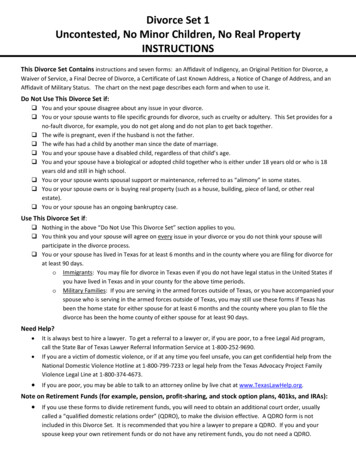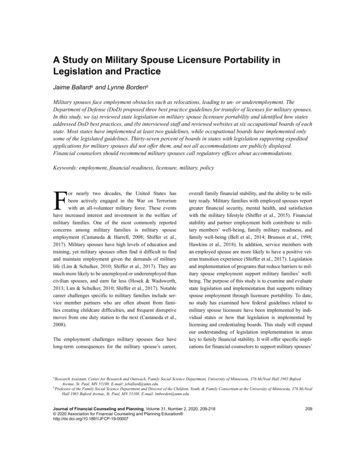
Transcription
A Study on Military Spouse Licensure Portability inLegislation and PracticeJaime Ballarda and Lynne BordenbMilitary spouses face employment obstacles such as relocations, leading to un- or underemployment. TheDepartment of Defense (DoD) proposed three best practice guidelines for transfer of licenses for military spouses.In this study, we (a) reviewed state legislation on military spouse licensure portability and identified how statesaddressed DoD best practices, and (b) interviewed staff and reviewed websites at six occupational boards of eachstate. Most states have implemented at least two guidelines, while occupational boards have implemented onlysome of the legislated guidelines. Thirty-seven percent of boards in states with legislation supporting expeditedapplications for military spouses did not offer them, and not all accommodations are publicly displayed.Financial counselors should recommend military spouses call regulatory offices about accommodations.Keywords: employment, financial readiness, licensure, military, policyFor nearly two decades, the United States hasbeen actively engaged in the War on Terrorismwith an all-volunteer military force. These eventshave increased interest and investment in the welfare ofmilitary families. One of the most commonly reportedconcerns among military families is military spouseemployment (Castaneda & Harrell, 2008; Shiffer et al.,2017). Military spouses have high levels of education andtraining, yet military spouses often find it difficult to findand maintain employment given the demands of militarylife (Lim & Schulker, 2010; Shiffer et al., 2017). They aremuch more likely to be unemployed or underemployed thancivilian spouses, and earn far less (Hosek & Wadsworth,2013; Lim & Schulker, 2010; Shiffer et al., 2017). Notablecareer challenges specific to military families include service member partners who are often absent from families creating childcare difficulties, and frequent disruptivemoves from one duty station to the next (Castaneda et al.,2008).The employment challenges military spouses face havelong-term consequences for the military spouse’s career,overall family financial stability, and the ability to be military ready. Military families with employed spouses reportgreater financial security, mental health, and satisfactionwith the military lifestyle (Shiffer et al., 2015). Financialstability and partner employment both contribute to military members’ well-being, family military readiness, andfamily well-being (Bell et al., 2014; Brunson et al., 1998;Hawkins et al., 2018). In addition, service members withan employed spouse are more likely to have a positive veteran transition experience (Shiffer et al., 2017). Legislationand implementation of programs that reduce barriers to military spouse employment support military families’ wellbeing. The purpose of this study is to examine and evaluatestate legislation and implementation that supports militaryspouse employment through licensure portability. To date,no study has examined how federal guidelines related tomilitary spouse licensure have been implemented by individual states or how that legislation is implemented bylicensing and credentialing boards. This study will expandour understanding of legislation implementation in areaskey to family financial stability. It will offer specific implications for financial counselors to support military spouses’aResearch Assistant, Center for Research and Outreach, Family Social Science Department, University of Minnesota, 376 McNeal Hall 1985 BufordAvenue, St. Paul, MN 55108. E-mail: jeballard@umn.edu.bProfessor of the Family Social Science Department and Director of the Children, Youth, & Family Consortium at the University of Minnesota, 376 McNealHall 1985 Buford Avenue, St. Paul, MN 55108. E-mail: lmborden@umn.edu.Pdf Folio:209Journal of Financial Counseling and Planning, Volume 31, Number 2, 2020, 209-218 2020 Association for Financial Counseling and Planning Education http://dx.doi.org/10.1891/JFCP-19-00007209
employment opportunities and financial readiness forchanges in station.Relevant Literature and Study ObjectivesFrequent Relocation as an Employment BarrierThe frequent moves that military families make from onebase to another is a key barrier to the spouses’ abilityto acquire employment. Service members are asked tomove approximately every 2–3 years (Hosek & Wadsworth,2013). It takes on average 10 months for spouses to findemployment following a move (Defense Manpower DataCenter, 2014). This delay in employment often leaves military spouses frustrated by their inability to pursue careersthey have worked hard to achieve. Permanent changes ofstation also disrupt opportunities for further education andtraining. Among military spouses who reported they wouldlike to be in school or training, 28% said they movedtoo often (Dorvil & Klein, 2016). Income uncertainty alsoreduces families’ likelihood of positive financial behaviors,such as investing in stock ownership (Shin & Kim, 2018).Military moves are also associated with a substantial declinein earnings, averaging 2,100 in the year of the move(Burke & Miller, 2016). The reduction in earnings persistsat least 2 years after the move (Burke & Miller, 2016).Although military families have more types of savingsaccounts than their civilian peers, they also have more problematic credit card behaviors (Skimmyhorn, 2016). Theseproblematic credit card behaviors may be due to familiesnavigating unpredictable schedules, locations, and incomestreams, as well as reductions in spouse income. Szendrey and Fiala (2018) found that lower perceived economicmobility among middle-class families is linked to poorercredit behaviors; it may be that families who are discouragedabout spouse income potential are less intentional in theircredit behaviors. Relocations can also lead to costs such ashigher car payments, as lending organizations are unwilling to give loans for used cars except over the long term athigh rates of interest, which does not match the short-termor unpredictable nature of the service member’s stay (Varcoe et al., 2003).Licensure Among Military SpousesMany military spouses pursue additional education or certification to overcome the employment challenges of being ina military family (Shiffer et al., 2015). Fifty percent of military spouses work in careers that require state licensure orPdf Folio:210210credentials (Maury & Stone, 2014). While the licensure orcredentials are a boon to military spouses’ overall employment and earning opportunities, it can be difficult to pursuethese careers in a new state. Over 40% of military spouseshave had difficulty with portability of licensure or credentials after a permanent change of station, which leads toemployment gaps and underemployment (Maury & Stone,2014). Successful legislation that facilitates the portabilityof military spouse licensure and credentials can offer military spouses the opportunity to maintain employment during geographic relocations and mitigate financial stress formilitary families (Kersey, 2013).Licensure Portability Trends for Military SpousesThe Department of Defense (DoD) has recognizedthat spousal employment must be addressed toensure service members and their families are military ready. Over the past decade, the DoD has created the Spouse Employment and Career Opportunities programs, started the “My Career AdvancementAccount” scholarship program, and expanded the Military Spouse Employment Partnership (MSEP; Friedmanet al., 2015; Gonzalez et al., 2015; Meadows et al.,2016).Moreover, the White House became actively involved inpromoting licensure portability in 2012, when First LadyMichelle Obama, along with the Second Lady Dr. Jill Biden,announced a call to action in support of professionallylicensed military spouses (White House, 2012). Mrs. Obamaand Dr. Biden asked that states create legislation to assistmilitary spouses in their ability to move their licenses andcredentials between states (Kersey, 2013).The DoD released the report Supporting our Families: BestPractices for Streamlining Occupational Licensing AcrossState Lines that year. This report identified three best practice guidelines each state could implement to promote portability of licenses and certificates held by military spouses.These best practices include: Endorsement—Occupational boards do not requirean examination for military spouses to transferlicenses Temporary or Provisional—Occupational boardsgive permission for military spouses to practiceJournal of Financial Counseling and Planning, Volume 31, Number 2, 2020
Collect data from occupational boards as to howthe legislation is implemented.while they submit additional materials and/or meetadditional requirements Expedited—Occupational boards prioritizemilitary spouses’ application processing (U.S.Department of Defense, 2012)Once again, a Blue Star family is part of the White Houseadministration (a Blue Star family is a family with at leastone member who has served in the military during a timeof conflict). The Second Lady of the United States, Mrs.Karen Pence, continues to champion the needs of military spouses. Mrs. Pence spoke recently about the importance of licensure portability as a key to military readiness(Associated Press, 2018). The Department of Defense StateLiaison Office (DSLO) likewise continues to advocatefor cross-state endorsements of licenses (Gonzalez et al.,2016).State LawsEffective implementation of legislation is necessary to provide the desired supports for military families. A review ofstate legislation in 2012 found that about half of the stateshad acted on the DoD’s recommendations and passed someform of licensure portability (Kersey, 2013). After 5 yearsof states enacting legislation to address the best practices formilitary spouse license portability, there is a need to reviewlegislation and to survey occupational boards to assess theextent to which the best practices guidelines are being met ineach state. Although there is variability as to how licensingagencies manage transfers of licenses or credentials for military spouses (e.g., Tex. Occ. Laws ch. 55 §001-009, 2015),it remains unclear how licensing and credentialing boardsimplement the legislation to ensure the transfer of licensesor credentials is completed in a timely and efficient manner.Study ObjectivesThis study was conducted through a grant from the U.S.Department of Agriculture as part of the DoD and Department of Agriculture Partnership for Military Families. TheDoD’s Office of Military Community and Family Policy andthe DSLO served as a resource throughout this study. Therewere two objectives for this study:Pdf Folio:211 Examine and evaluate the current legislation ineach state and Washington, DC, that applies tomilitary spouse licensure portabilityMethodsProcedureIn Phase One, the research team identified legislation ineach state related to military spouses and licensure portability (November 2016–January 2017). The institutionalreview board at the authors’ university determined this studywas exempt from review. Two research scientists coded allinformation separately and their findings were compared toensure accuracy. When disagreements occurred, these werediscussed with a representative from the DoD State Liaison Office and discrepant codes were resolved. In addition,the Military Officers Association of America (MOAA) provided information regarding licensure and credentials portability for military spouses. The review of the legislation andinformation provided by MOAA was used to develop thequestions for the occupational board staff during the secondphase.In Phase Two, the DoD Office of Military Community andFamily Policy’s Defense-State Liaison’s office identifiedthe occupations to be reviewed. Occupations were excludedif they were part of other initiatives that impacted licenseportability (e.g., compacts for nursing and physical therapist), or if there were improvements made in law thatwould require implementation (e.g., teacher certification).Occupations were then identified that were part of a potential growing market or particularly applicable to militaryspouses (such as those commonly pursued through the DoDMy Career Advancement Account). The six boards identified were: Cosmetology, Dental Hygiene, Massage Therapy, Mental Health Counseling, Occupational Therapy, andReal Estate Commission.A comprehensive procedure was developed for the reviewof the occupational board including a detailed review of theboard’s website and scripted calls with a member of theoccupational board. Boards were contacted by telephone orby email about the process to transfer licenses or credentials specific to military spouses who were new residents andfully licensed in their previous jurisdiction. Each researcherreceived training on how to conduct the call. Interviews ofstaff at occupational boards were conducted over 3 months.Journal of Financial Counseling and Planning, Volume 31, Number 2, 2020211
Six occupational boards were contacted in 50 states andWashington, DC, totaling 306 initial contacts (via telephoneand email). Out of 306 occupational boards, 3 boards neverreturned phone calls or emails for an interview.MeasuresState Legislation Related to Military Spouses and Licensure Portability. Two research scientists independentlyreviewed and coded the legislation for each of the 50 statesand Washington, DC, using the following variables: (a) yearlegislation was enacted, (b) spouses’ Service members’ status to benefit from the legislation (e.g., active duty, NationalGuard or Reserves, veterans, or deceased service member),(c) definition of legal union (e.g., married, domestic partners) needed to benefit from license portability accommodations, (d) process for transfer (e.g., transfer license viaendorsement, temporary license, and/or expedited procedures), (e) requirements of supplemental information withapplication (e.g., background check, continuing educationrequirements), (f) timeline of temporary license, (g) lengthof time spouses have to benefit after relocation, and (h) temporary license granted by new state or spouses allowed topractice with previous state’s license. Research scientistsadditionally coded (a) if the legislation used the words shall/must, may, or both, and (b) if legislation used the phrase“substantially equivalent.”Occupation Board Implementation of Legislation. Thescript for the interview is available from authors uponrequest. Research scientists additionally documented thestaff title to whom they were directed (manager/director,licensing specialist, reception staff, etc.), and whether theywere directed to the website. Research scientists reviewedwebsites and applications for any specific information orquestions about military status and for the number ofrequirements to transfer a license.ResultsPhase OneFigure 1 summarizes the legislation from the 50 states andWashington, DC, in the three areas recommended by theDoD. Figure 2 provides the legislation titles. All states andWashington, DC, have legislation or occupational boardpolicies that support new residents’ portability of occupational licenses and credentials from previous states andjurisdictions. Most (n 46) have also enacted legislationspecific to that of military spouses. A quarter (n 17) hadPdf Folio:212212legislation at the time of this study that proposed two ofthe best practice guidelines for military spouses portability.Furthermore, half of the states (n 25) have legislation specific to military spouses that encompasses all three of thebest practice guidelines to lessen or remove impediments forspouses.The 46 states that have enacted legislation used a wide rangeof language to describe how occupational boards are eitherrequired or encouraged to facilitate portability of licensesfor spouses. Legislation in most states (n 35) uses “shall”or “must” in describing how occupational boards shouldfacilitate licensure portability, while seven states use “may”and four states use both “shall” and “may.” For example,Nebraska legislation states occupational boards shall issuetemporary licenses while legislation in Alaska states boardsshall expedite the issuance of licenses and may issue temporary licenses. The wide variability in language among thestates may have contributed to the considerable range of processes of transfer for spouses relocating to various states.Similarly, the term “substantially equivalent” was frequently used to describe the educational requirementsneeded by military spouses to transfer the license or credential. Although using this phrase allows each board todetermine the necessary requirements to meet before issuing licenses, due to its ambiguity, the phrase is likely to leadto a lack of clarity for military spouses about the experienceor information they must possess.We note two other key differences between states in theirlegislation: Legislation in California and Oregon includesdomestic partners as eligible to benefit from billsregarding military spouse licensure portability. State legislation from seven states also includesspouses of veterans and/or deceased servicemembers as eligible to benefit from bills regardingmilitary spouses’ licensure portability: Arkansas,Colorado, Kansas, Maine, Maryland, New Mexico,and Vermont.Phase TwoOccupational boards have implemented only a portion ofthe legislated best practice guidelines. We chose to summarize the implementation of one best practice guideline,Journal of Financial Counseling and Planning, Volume 31, Number 2, 2020
aExpeditedapplicationTemporary orprovisionallicensingLicensure byendorsementExpeditedapplicationTemporary orprovisionallicensingLicensure byendorsementFigure 1. Military spouse licensure portability legislation summary by state.NebraskaNevadaNew HampshireNew JerseyNew MexicoNew YorkNorth CarolinaNorth DakotaOhioOklahomaOregonPennsylvaniaRhode IslandSouth CarolinaSouth ashington, DCWest VirginiaWisconsinWyomingNot addressed in legislationAddressed in legislationNote. Data collected between November 2016 and January 2017.expedition of applications, for this study. We compileda table that displays board implementation of state legislation on expedition of applications for military spouses(the table is available from the authors upon request).Of the 186 boards in 31 states with legislation supporting expedited applications, only 68 boards (37%)expedited applications. Forty-nine boards (26%) eitherhad no state-specific licensing requirements or processedapplications within 2 weeks for all applicants. Sixtynine boards (37%) neither expedited applications for military spouses nor had quick processing times for allapplicants.Furthermore, not all implementations are publicly displayed. Occupational board staff routinely (n 187) directedresearch scientists to the website to find answers to theirquestions. All occupational boards had information aboutobtaining a license on the website. However, only 44%(n 134) had information specific to military spouse licenseportability.Most occupational board applications (59%, n 179) did notindicate how military spouses should identify themselvesto benefit from accommodations. Of the 92 boards whoexpedited applications for military spouses, 24% (n 23)did not post information on their website or ask a question about military status on the application. Numerous staffstated that they believed spouses would call the board toidentify themselves.There was a wide variation among which occupational board staff answered interview questions. Licensing or credentialing specialists, supervisors/managers,and board directors were frequently aware of theirstate’s legislation regarding military spouse licensureportability. Customer service representatives were mostPdf Folio:213Journal of Financial Counseling and Planning, Volume 31, Number 2, 2020213
Figure 2. Military spouse licensure portability legislation summary by state.AlabamaAlaskaArizonaLegislation TitleHouse Bill 638 (2012)House Bill 28 (2011)NebraskaNevadaSenate Bill 1458 (2011)New HampshireLegislation TitleLegislative Bill 88 (2017)House Bill 89 (2015)Chapter 117 (RSA 332-G:7)(2014)Public Law 2013, Chapter264 (2013)New JerseyConnecticutCode § 17-1-106 (2013)House Bill 1723 (2014)House Bill 1184 (2017)Bill 1904 (2012)Bill 186 (2014)HB 12-1059 (2012)HB 15-1015 (2015)Section 20-332-21a (1993)DelawareStatute Chapter 329 (2014)North DakotaGeorgiaHawaiiHouse Bill 821 (2016)Bill 2257 (2012)ACT 185, SLH 2013 (2013)Senate Bill 1068 (2013)Senate Bill 275 (2012)OklahomaOregonSenate Bill No. 253 (2012)House Enrolled Act No. 1116 (2012)Senate Enrolled Act No. 219 (2016)NoneHouse Bill 2178 (2012)House Bill 2154 (2015)House Bill 301 (2011)South CarolinaHouse Bill 732 (2012)Revised Statute 37:3651, Chapter59 (2016)Public Law 311 (2013)Veterans Full Employment Act of2013 (2013)UtahVALOR Act (2013)VALOR Act II (2014)Act 299, Section 339.213 (2014)House Bill 3172 (2014)Regulation Part 2601, Chapter 7(2014)Senate Bill 2419 (2013)House Bill No. 136 (2011)House Bill 94 (2011)WashingtonAct 177 (2014)House Bill 937 (2012)House Bill 1247 (2014)House Bill 405 (2016)Bill 5969 (2012)Washington, DCWest VirginiaWisconsinNoneBill 4151 (2014)Senate Bill 550 (2011)WyomingBill 74 ntanaBill 1228 (2011)Bill 941 (2016)New MexicoHouse Bill 180 (2013)New YorkChapter 299 (2016)North CarolinaHouse Bill 799 (2011)Senate Bill 8 (2017)House Bill 1246 (2013)OhioPennsylvaniaRhode IslandSouth DakotaTennesseeTexasVermontVirginiaHouse Bill 490 (2012)House Bill 75 (proposed2017)Senate Bill 1863 (2012)House Bill 2037 (2013)NoneBill 629 (2013)Bill 5712 (2013)Bill 417 (2013)Bill 3710 (2012)Bill 1107 (2012)Bill 177 (2013)Senate Bill 1039/House Bill968 (2011)Senate Bill 162 (2013)Senate Bill 1733 (2011)House Bill 384 (2016)Note. Data collected between November 2016 and January 2017.Pdf Folio:214214Journal of Financial Counseling and Planning, Volume 31, Number 2, 2020
often not aware of the legislation specific to militaryspouses.Discussion and ImplicationsIn this study we assessed the state legislation of the threebest practices identified by the DoD and their implementation by six occupational boards. Most states (n 48) haveenacted legislation to facilitate the portability of licenses andcredentials for military spouses and more than half of thosestates (n 40) have implemented at least two of the bestpractices guidelines. We recommend that lawmakers requireall three best practices.Occupational boards have implemented only a portionof the legislated best practice guidelines. Nearly 40%of boards in states with legislation supporting expeditedapplications for military spouses neither offered expeditedapplications for military spouses nor had quick processing times for all applicants. Military spouses in thesestates would face long waits after application, even if otheraccommodations are available (such as licensure byendorsement or temporary/provisional licenses).Most websites and applications did not contain information about transfer processes specific to military spouses.This lack of transparency can increase barriers for military spouses navigating relicensure in a new state. Military spouses who are unemployed or underemployed reportlower job-search self-efficacy (Trougakos et al., 2007), andindividuals who are unemployed or low-income are lessthorough in their searches for information (Loibl et al.,2009). Military spouses, particularly those who are currentlyun- or under-employed, may not go the extra step of callingthe board to self-identify or to ask about accommodationsfor military spouses. Military spouses report that web pages(both military and nonmilitary) are one of the most used anduseful financial resources (Plantier & Durband, 2007). Displaying accommodations on websites is an important steptowards disseminating information to military spouses.Implications for Occupational BoardsWe recommend that occupational boards prominentlydisplay information about accommodations for militaryspouses. Occupational board websites could include a linkto the legislation on portability of licensure for militaryspouses. The link will increase exposure of information forstaff as well as military families. Board executive directorsPdf Folio:215can include questions about military status on all licensureapplications, especially for applications to transfer licensesfrom another jurisdiction. Occupational boards may alsoidentify a specific staff member to serve as a point of contact for military spouses.Implications for Financial Counselors and PlannersFinancial counselors working with military families havegreat opportunities to support financial well-being bothbefore and after a permanent change of station that impactsspouse employment. For military clients who are not yetgoing through a change in station, financial counselors canwork to reduce family financial anxiety. Spousal financialstress generally increases in the period right before a permanent change of station (Tong et al., 2018). Related researchwith military families suggests that financial stress is linkedto poorer financial behaviors (Carlson et al., 2015). Financial counselors can educate families about the challenges inemployment after a permanent change of station and encourage military families to create savings to prepare for potential interruptions in a spouse’s employment. Research suggests that families make saving decisions based on theirexpected income, and that they are more likely to save ifthey are saving to be prepared for an emergency (in comparison to saving for retirement, education, a home, etc.; Shin& Kim, 2018). Financial counselors therefore have a keyopportunity to educate their military clients about potentialchanges in income and to help motivate them to prepare bysaving. Financial education through the military or anotheremployer has been linked to greater financial literacy, particularly for groups otherwise at risk of low literacy rates(Wagner, 2019).Furthermore, financial counselors can connect military families with resources to alleviate employment and financialdisruptions with a change in station. There are supportsavailable for spousal employment and all other major disruptions experienced during a permanent change of station(Tong et al., 2018). For example, the Military OneSourceCareer Center offers free career counseling, and the MSEPoffers a web portal of jobs offered by companies that promote employment for military spouses. A list of availableservices is provided in Appendix C of the publicly accessible RAND report, “Enhancing Family Stability During aPermanent Change of Station” (Tong et al., 2018). Knowingabout these resources in advance can help reduce financialanxiety during a change in station.Journal of Financial Counseling and Planning, Volume 31, Number 2, 2020215
After a permanent change of station, financial counselorscould ask a military family their hopes for the spouse’semployment, and about the spouse’s experience and credentials. If the military spouse is pursuing a licensure or credential in the new location, financial counselors should recommend the military spouse call the regulatory office toinquire about processing accommodations. Our study indicates that many boards have accommodations available,even when they are not publicly displayed. In our interviews, licensing or credentialing specialists and supervisorswere frequently aware of the state’s legislation on militaryspouse portability, while customer service representativeswere not. Consequently, financial counselors should recommend that clients call and ask to speak with a licensingspecialist or manager about accommodations. Counselorswith many military clients may choose to contact boardlicensing specialists or managers directly to inquire aboutaccommodations.Well-implemented policies have the potential to supportmilitary spouse employment and military family well-being.The state legislation that currently allows or requires licensure by endorsement, temporary licenses, and expeditedapplications and the boards that implement these policiesfor military spouses support spouse employment and wellbeing for military families. Increased implementation andpublic display of these practices will further support military family well-being. Financial counselors can preparefamilies financially for potential delays in employment andprovide resources to help them navigate the process ofestablishing licensure, ensuring stability for military families during this gap between legislation and implementation.ReferencesAssociated Press. (2018). The latest: Karen Pence promotesmilitary spouse support [Press Release]. Retrieved 76318Bell, M., Nelson, J., Spann, S., Molloy, C., Britt, S., &Goff, B. (2014). The impact of financial resourceson soldiers’ well-being. Journal of Financial Counseling and Planning, 25(1), 41–52. Retrieved t id 2466556Brunson, B. H., Snow, M., & Gustafson, A. W. (1998). Midlife career change: Career military versus noncareermilitary financial well-being and financial satisfaction.Pdf Folio:216216Journal of Financial Counseling and Planning, 9(1),41–52.Burke, J., & Miller, A. R. (2016). The effects of militarychange of station moves on spousal earnings. SantaMonica, CA: RAND Corporation. Retrieved fromhttps://www.rand.org/pubs/working papers/WR1170.html.Carlson, M. B., Britt, S. L., & Goff, B. N. (2015). Factors associated with a composite measure of financia
that spousal employment must be addressed to ensure service members and their families are mili-tary ready. Over the past decade, the DoD has cre-ated the Spouse Employment and Career Opportuni-ties programs, started the "My Career Advancement Account" scholarship program, and expanded the Mili-tary Spouse Employment Partnership (MSEP; Friedman
